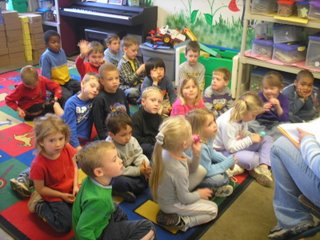 What a lovely response to the last post. Thank you former parent. Blessings on your family.
What a lovely response to the last post. Thank you former parent. Blessings on your family.I suppose we should just change those classroom designations and call them the Silver Room and the Gold Room. Mrs. St. Louis can call her class the Angels. The question of what goes on in those rooms would be the question most parents would ask, and the answer is kindergarten and first grade, so the circle goes round and round.
More than anything else, our curriculum is made for the individual child. We have a child who informed us about a week ago that he is smarter than both his parents and certainly all his teachers. "Great," I said, "That's just what I want to know. Tomorrow, you can do what scholars do - independent study. I'll show you how tomorrow."
So the next day, I told him to choose a book in the school from any of the libraries. "Science, history, geography, children's shelves, teacher's shelves - go choose, and he did. He chose a book off the science shelf about the sun.
"I want you to read as much of the book as you need to read to write three sentences. Then I want you to draw a picture of what you think the book said."
In two hours he accomplished nothing.
"Self discipline is part of scholarship," I remarked briskly. He gave me a wicked look. "Smart people finish assignments." Scowl, scowl, scowl.
Truly it was funny. He was torn between two lovers - feeling like a fool. He was torn between pride and humility. Pride won. And pride that wins most often makes us look small again. I tried to explain to him that he has the brains and wit to accomplish great things, and this little assignment could have offered him a way and means and a scheme to learn more than any other child in the school, and through humility and duty he could achieve so much, but he preferred to succumb to pride and sloth. It is better to brag about one's brain than to do the work necessary to use it.
It reminds me of two students we had last year. One could read anything in print. He actually read Chaucer in Middle English. And we had a little girl who was "learning" as she said to read. When it came time for the play, I asked the boy, because he was the better reader, to read the little Angel intro to the play. I noticed that he continued to mispronounce the same difficult words. He was absent one day, and I asked the girl to read for him. When she began, I began to listen carefully. She read slower than the boy but she didn't mispronounce the words. And when I took each aside and asked them what they were reading, only she understood. He read like a parrot, she, like a scholar. She ended up reading the intro for the play. Both children were six.
Teaching children is not a "this then that" approach. Covering a text book and a list of "to dos" won't cut it. Teaching why we learn, and what to look for when we learn, and being able to verbalize what has been learned as well as write about it is real learning. This starts at age three not thirteen.
One of my interests is how the eleven passions play off the virtues and the vices in every person I work with. Using the passions to attract virtue begins in the infant years. Virtue is a big part of growing up and staying up. It's the gasoline for scholarship and the sign of being an adult.

2 comments:
Shame on you for saying a child reads like a parrot. You always say that children should not be labeled yet you just put a label on a child.
Miss Judy is not poking fun at the child for his ability or lack of ability to read. She is giving you a discription of what the child sounded like while delivering his lines. The child she is speaking of was not "labeled" as anything but brilliant for reading at the age of 6! If I were to say that a child gobbled his plate of food like a little piggy would that be labeling that child an animal? Lighten up!
Post a Comment